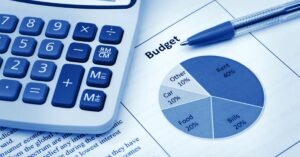Last Updated on 19 June 2024
Budget Calculator
Budgeting is essential for managing your finances and achieving your goals. However, creating a budget and sticking to it can be challenging without the right tools and strategies. This is where a budget planner and calculator come in handy. Using these tools, you can effectively track your income and expenses, identify areas where you can save money, and ultimately gain better control over your finances.
In this article, we will explore the concept of budgeting and how a budget planner and calculator can simplify the process. We will also provide practical tips for setting up a budget planner and customizing your budget categories to suit your needs. Whether you are new to budgeting or looking to improve your existing budgeting practices, I will provide the information and tools you need to make budgeting easy and effective.
What is a budget planner?
A budget planner is a tool or system that helps you manage your finances by tracking your income and expenses. It allows you to create a monthly budget, allocate funds to different categories, and monitor your spending. A budget planner can be as simple as a spreadsheet or sophisticated as a budgeting app. It provides a clear overview of your financial situation and helps you make informed decisions about your money.
Using a budget planner lets you easily see where your money is going and make adjustments to ensure you are staying within your means. It also helps you budget effectively even with a low income.
What is a budget?
A budget is a financial plan outlining your income and expenses over a specific period, typically monthly. It helps you allocate your money wisely and ensures you are not spending more than you earn. A budget allows you to set financial goals, track progress, and adjust as needed. It provides a roadmap for your financial journey and helps you stay on track.
A budget consists of two main components: income and expenses. Income includes any money you receive, such as your salary, side hustle income, or investment returns. Expenses encompass all the money you spend on various categories, such as housing, transportation, groceries, and entertainment. By creating a budget, you can prioritize your spending, identify areas where you can cut back, and make informed decisions about your financial priorities.
How to Budget
Budgeting may initially seem overwhelming, but it shouldn’t be complicated. Here are some steps to help you create an effective budget:
- Calculate your monthly income: Determine your total monthly income from all sources.
- Identify your expenses: List all your fixed expenses (e.g., rent, utilities, loan payments) and variable expenses (e.g., groceries, entertainment).
- Set financial goals: Determine your short-term and long-term goals, such as saving for a down payment or paying off debt.
- Allocate funds: Based on your income and financial goals, assign a specific amount of money to each expense category.
- Track your spending: Monitor and compare monthly expenses to budgeted amounts.
- Make adjustments: If you consistently overspend in certain categories, consider adjusting your budget or finding ways to reduce expenses.
- Review and revise: Review your budget regularly to ensure it aligns with your financial goals and make revisions as needed.
What are incomes?
Incomes are the funds you receive regularly, such as your salary, side hustle income, or investment returns. Understanding your income is essential when creating a budget. Here are some key points to consider:
- Calculate your gross income: Determine your total income before taxes and deductions. This includes your salary, bonuses, commissions, and other income sources.
- Consider net income: Net income is the money you take home after taxes and deductions. You will use this income when budgeting.
- Include all sources of income: When calculating your total income, remember to include any additional sources of income, such as rental income or investment returns.
- Be realistic: When budgeting, it’s important to use a realistic estimate of your income. Consider any fluctuations or irregularities in your income and factor them into your budget.
By accurately assessing your income, you can allocate your funds to different expense categories and ensure that your budget reflects your financial reality.
What are expenses?
Expenses are the costs associated with your daily living, such as housing, transportation, groceries, and entertainment. When creating a budget, it’s important to categorize and prioritize your expenses. Here are some key points to consider:
- Fixed vs. variable expenses: Fixed expenses, such as rent or mortgage payments, insurance premiums, and loan payments, remain relatively constant each month. Variable costs, on the other hand, can fluctuate from month to month, such as groceries, entertainment, and discretionary spending.
- Prioritize essential expenses: Start by allocating funds to essential expenses, such as housing, utilities, transportation, and groceries. These are the expenses that are necessary for your basic needs.
- Evaluate discretionary spending: Take a closer look at your discretionary spending, such as entertainment or dining out, and determine if there are areas where you can cut back.
- Plan for savings and emergencies: Don’t forget to allocate funds for savings and emergencies. Building an emergency fund and saving for future goals should be integral to your budget.
By carefully assessing your expenses and making strategic choices, you can ensure that your budget aligns with your financial goals and priorities.
Understanding Your Financial Landscape
Understanding your financial landscape is crucial to budgeting effectively. It involves assessing your monthly income, identifying fixed vs. variable expenses, and understanding your financial situation. By understanding your financial landscape, you can make informed decisions about your money and set realistic goals. This knowledge allows you to create a budget that reflects your current financial reality and helps you progress toward your financial goals.
Assessing Monthly Income
Assessing your monthly income is important for understanding your financial landscape and creating an effective budget. Here are some key points to consider:

- Calculate your gross income: Gross income refers to the total amount you earn before any taxes or deductions are taken out. This includes your salary, wages, bonuses, commissions, and any other sources of income.
- Consider your net income: Net income is the money you take home after taxes and deductions. It is the income you will use when budgeting.
- Factor in irregular income: If you have irregular income, such as freelancing or side hustles, it’s important to consider the variability of your income when budgeting. Take the average income over a specific period to get a more accurate picture.
- Be realistic: When assessing your income, it’s important to be realistic and consider any fluctuations or irregularities. Use a conservative estimate to ensure that your budget is achievable.
By accurately assessing your monthly income, you can allocate your funds effectively and create a budget that reflects your financial reality.
Identifying Fixed vs. Variable Expenses
When creating a budget, it’s important to distinguish between fixed and variable expenses. Here’s what you need to know:
- Fixed expenses: These are expenses that remain relatively constant each month. Examples include rent or mortgage payments, insurance premiums, car payments, and student loans. These expenses are typically necessary.
- Variable expenses: These expenses can fluctuate from month to month. Examples include groceries, entertainment, dining out, and discretionary spending. Variable expenses are more flexible and can be adjusted based on your financial situation and priorities.
By identifying your fixed and variable expenses, you can prioritize essential expenses and make informed decisions about your discretionary spending. This helps you allocate your funds effectively and stay within your budget.
Setting Up Your Budget Planner
Setting up a budget planner is crucial for effective budgeting. It allows you to track your income and expenses, allocate funds to different categories, and monitor your spending. Here are some key steps to setting up your budget planner:
- Choose a budgeting tool: Select a budgeting tool that suits your needs, whether it’s a simple spreadsheet or a budgeting app.
- Define your budget categories: Determine the different expense categories relevant to your financial situation, such as housing, transportation, groceries, and entertainment.
- Allocate funds: Assign a specific amount of money to each category based on your income and financial goals.
- Track your spending: Regularly update your budget planner and track your expenses throughout the month.
By setting up your budget planner, you can stay organized, monitor your spending, and make informed decisions about your money.
Money Management: 4 Tips for Mastering Your Finances
Effective money management is essential for financial success. Here are four tips to help you master your finances:
- Create a budget: A budget provides a roadmap for your financial journey. Track your income and expenses, prioritize your spending, and make adjustments as needed.
- Build an emergency fund: An emergency fund provides a safety net for unexpected expenses. Aim to save three to six months’ worth of living expenses in case of emergencies.
- Pay off high-interest debt: High-interest debt can drain your finances. Prioritize paying off debts with the highest interest rates first to save money on interest payments.
- Save for the future: Plan for your long-term goals, such as retirement or a down payment on a house. Save consistently and take advantage of employer retirement plans or individual retirement accounts (IRAs).
By following these tips, you can take control of your finances and work towards achieving your financial goals.
The Role of a Budget Calculator
A budget calculator plays a vital role in simplifying the budgeting process. Here’s why it’s valuable:
- Accurate calculations: A budget calculator uses mathematical formulas to accurately calculate your income and expenses. This eliminates the need for manual calculations and reduces the risk of errors.
- Time-saving: By automating calculations, a budget calculator saves you time and effort. It provides instant results and helps you create a budget more efficiently.
- Real-time tracking: Many budget calculators come with features that allow you to track your spending in real-time. This helps you stay on top of your finances and make adjustments as needed.
- Customization options: Budget calculators often provide customization options, allowing you to tailor the budget to your specific needs. You can adjust category names, add or remove expense categories, and set personalized budget goals.
By utilizing a budget calculator, you can streamline the budgeting process, track your finances more effectively, and make informed decisions about your money.
Customizing Your Budget Categories
Customizing your budget categories is an important step in creating a budget that reflects your individual financial situation and priorities. Here’s why it’s valuable:
- Personalization: By customizing your budget categories, you can align your budget with your unique financial goals and spending patterns. This allows you to focus on what matters most to you.
- Flexibility: Customizing your budget categories gives you the flexibility to adapt your budget as your financial situation changes. You can add or remove categories based on your evolving needs.
- Accuracy: Tailoring your budget categories ensures that you are accurately tracking your income and expenses. This provides a more accurate representation of your financial landscape.
- Motivation: By customizing your budget categories, you can set goals and track your progress more effectively. This can boost your motivation and make budgeting more engaging.
By customizing your budget categories, you can create a budget that is tailored to your individual needs, helping you achieve your financial goals more effectively.
Strategies to Maximize Savings
Maximizing savings is an important aspect of budgeting. Here are some strategies to help you make the most of your savings:
- Automate your savings: Set up automatic transfers to a savings account to ensure consistent saving.
- Cut back on discretionary spending: Identify areas where you can reduce unnecessary expenses and allocate those funds to savings.
- Set savings goals: Establish specific savings goals and track your progress regularly. This can help motivate you to save more.
- Take advantage of employer retirement plans: Contribute to employer-sponsored retirement plans, such as 401(k)s, to benefit from tax advantages and employer matches.
By implementing these strategies, you can effectively grow your savings and work towards achieving your financial goals.
Prioritizing Emergency Funds
One of the key highlights of budget planning is prioritizing emergency funds. An emergency fund acts as a safety net for unexpected expenses and provides financial security during challenging times. It is recommended to save at least three to six months’ worth of living expenses in your emergency fund. This fund can cover unexpected medical expenses, car repairs, or even a sudden job loss. By prioritizing emergency funds, you can avoid going into debt or relying on credit cards to cover these expenses. Saving regularly and automating your savings can help you build your emergency fund over time and ensure you are prepared for any unforeseen circumstances.
Smart Saving Tips for Long-term Goals
When it comes to long-term goals, such as retirement or buying a house, it is important to have a smart saving strategy. Start by setting specific financial goals and create a timeline for achieving them. This will help you stay motivated and focused on saving. Consider automating your savings by setting up automatic transfers from your checking account to a separate savings account. This way, you won’t have to rely on willpower alone to save. Additionally, explore investment options that can potentially grow your savings over time, such as retirement accounts or mutual funds. By being disciplined and consistent with your saving habits, you can make significant progress towards your long-term financial goals.
Optimizing Expenses
To effectively manage your budget, it is essential to optimize your expenses. This involves finding ways to cut down on unnecessary spending and making smart choices when it comes to your financial commitments. By evaluating your expenses and identifying areas where you can reduce costs, you can free up more money to allocate towards your savings or other financial goals. In the following sections, we will explore specific strategies to cut down on unnecessary spending and negotiate bills and subscriptions to help you optimize your expenses.
Cutting Down Unnecessary Spending
One of the best ways to optimize your expenses is by cutting down on unnecessary spending. Start by reviewing your monthly expenses and identifying any non-essential items or services that you can eliminate or reduce. For example, consider cutting back on dining out or entertainment expenses and instead opt for homemade meals or free activities. Additionally, review your subscription services and cancel those that you no longer use or find value in. By consciously making these small changes, you can significantly reduce your monthly expenses and redirect that money towards your savings or other financial goals.
Negotiating Bills and Subscriptions
Another effective strategy to optimize your expenses is by negotiating bills and subscriptions. Many service providers are willing to negotiate lower rates or offer promotional deals to retain customers. Start by researching the current market rates for the services you use, such as internet, cable, or insurance. Armed with this information, reach out to your providers and inquire about any available discounts or better pricing options. Additionally, review your subscriptions regularly and contact the companies to negotiate lower rates or cancel subscriptions that are no longer necessary. By being proactive and assertive, you can potentially save a significant amount of money on your monthly bills.
Best Practices for the Budget Categories
To effectively manage your budget, it is important to have best practices in place for each budget category. In the following sections, we will explore best practices for budgeting in different categories such as monthly income, giving, savings, food, utilities, housing, transportation, insurance, and household items. By following these best practices, you can ensure that your budget is well-balanced and aligned with your financial goals.
Monthly Income
Your monthly income is the foundation of your budget. It includes your regular paycheck as well as any additional income you earn, such as a side hustle or freelance work. When budgeting your monthly income, it is important to account for taxes and deductions to get an accurate picture of your take-home pay. This will help you determine how much you can allocate towards different budget categories. It is also a good practice to review your income regularly and look for opportunities to increase your earning potential, such as asking for a raise or exploring new sources of income.
Giving
Giving is an important aspect of budget planning. It allows you to support causes and organizations that you care about and make a positive impact in the world. When budgeting for giving, consider setting aside a certain percentage or fixed amount of your monthly income. This can be directed towards charitable donations, religious offerings, or any other form of giving that aligns with your values. By including giving as a budget category, you can ensure that it is a priority in your financial plan and allocate funds accordingly.
Savings
Savings is a crucial part of budget planning and financial security. When budgeting for savings, it is important to set specific goals and determine how much you can save each month. Start by establishing an emergency fund to cover unexpected expenses, such as medical bills or car repairs. Aim to save at least three to six months’ worth of living expenses in your emergency fund. Once you have the emergency fund in place, you can focus on long-term savings goals, such as retirement or buying a house. Consider automating your savings and exploring investment options to help your savings grow over time.
Food
Food is a major expense for most households, and it is important to budget for it accordingly. When budgeting for food, start by tracking your expenses and understanding how much you currently spend on groceries and dining out. Look for ways to reduce costs, such as meal planning, buying in bulk, or utilizing coupons. Consider cooking at home more often and exploring affordable yet nutritious meal options. By being mindful of your food expenses and making intentional choices, you can save money and still enjoy delicious meals.
Utilities
Utilities include essential expenses such as electricity, water, gas, and internet services. When budgeting for utilities, it is important to review your past bills and estimate your average monthly usage. Look for ways to reduce consumption, such as turning off lights when not in use or adjusting the thermostat to conserve energy. Additionally, compare different providers and plans to ensure you are getting the best rates for your services. By being proactive in managing your utility expenses, you can save money and reduce your overall monthly costs.
Housing
Housing costs are typically one of the largest expenses in a budget. When budgeting for housing, it is important to consider not only your mortgage or rent payments but also other associated costs such as property taxes, insurance, and maintenance. Aim to spend no more than 25% of your take-home pay on housing expenses to ensure you have enough room in your budget for other financial goals. If your housing costs are higher than this threshold, consider exploring options to reduce costs, such as downsizing or refinancing your mortgage.
Transportation
Transportation expenses include your car payments, fuel costs, insurance, and maintenance. When budgeting for transportation, it is important to consider all these factors and determine how much you can afford to allocate towards this category. Look for ways to reduce costs, such as carpooling, using public transportation, or exploring alternatives like biking or walking. Consider refinancing your auto loan or shopping around for lower insurance rates to potentially save money. By being conscious of your transportation expenses, you can optimize this category and free up more funds for other areas of your budget.
Insurance
Insurance is an essential expense to protect yourself and your assets. When budgeting for insurance, consider the different types of coverage you need, such as health, auto, home, or life insurance. Review your policies regularly and shop around for the best rates to ensure you are getting adequate coverage at a reasonable price. Consider bundling your policies with one provider to potentially save on premiums. By including insurance as a budget category, you can ensure that you are adequately protected without overspending on premiums.
Household Items
Household items include everyday essentials such as toiletries, cleaning supplies, and other household necessities. When budgeting for household items, it is important to estimate your monthly expenses based on your past spending. Consider buying in bulk or taking advantage of sales and discounts to save money. Look for ways to reduce waste and be mindful of your consumption to avoid unnecessary expenses. By budgeting for household items, you can ensure that you have enough funds set aside for these essential purchases without overspending.
Debt
Debt is a common financial challenge that many people face. Whether it’s credit card debt, student loans, or car payments, managing debt is crucial for maintaining financial health. The budget calculator includes a category for debt, allowing users to input their monthly payments and track their progress in paying off their debts.

By including debt in the budget, individuals can see exactly how much they owe and how it impacts their overall financial picture. This information can be eye-opening and motivate individuals to make necessary changes to reduce their debt. The budget calculator also provides an opportunity to allocate more money towards debt repayment, helping individuals prioritize their financial goals and take steps towards becoming debt-free.
Retirement
Planning for retirement is an important aspect of financial wellness. The budget calculator includes a category for retirement savings, encouraging individuals to allocate a portion of their income towards building a retirement nest egg. By inputting their monthly contributions, individuals can track their progress and ensure they are on track to meet their retirement goals.
The calculator also highlights the importance of starting retirement savings early and taking advantage of employer-matched contributions or tax-advantaged retirement accounts. By including retirement savings in the budget, individuals can make it a priority and ensure they are setting aside enough money for their future. Planning for retirement is not just about saving money, but also about making informed investment decisions to maximize growth and minimize risk.
Personal and Entertainment
While it’s important to prioritize expenses like debt and retirement savings, it’s also essential to budget for personal and entertainment expenses. The budget calculator includes a category for personal and entertainment, which allows individuals to allocate funds for activities like dining out, hobbies, and vacations.
By budgeting for personal and entertainment expenses, individuals can enjoy life while still maintaining financial responsibility. It’s important to strike a balance between saving and spending, and budgeting allows individuals to do just that. By tracking personal and entertainment expenses, individuals can see where their money is going and make adjustments if necessary. This category also serves as a reminder to prioritize experiences and activities that bring joy and fulfillment to life.
Other
The budget calculator provides categories for common expenses such as housing, transportation, food, and utilities. However, it’s important to remember that everyone’s financial situation is unique, and there may be additional expenses that need to be included in the budget. That’s where the “Other” category comes in.
The “Other” category allows individuals to account for miscellaneous expenses that may not fit into the predefined categories. This could include expenses like pet care, gifts, subscriptions, or any other expenses that are specific to an individual’s lifestyle. By including this category, individuals can have a comprehensive view of their expenses and ensure that their budget accounts for all their financial obligations and goals.
Childcare
For individuals with children, childcare expenses can be a significant portion of their budget. The budget calculator includes a category for childcare, allowing parents to input their monthly expenses for daycare, babysitters, or other childcare services.
By including childcare in the budget, parents can track their expenses and ensure that they are allocating enough funds for this important aspect of their family’s life. It also provides an opportunity to evaluate different childcare options and make adjustments if necessary. Childcare expenses can vary widely depending on the location, age of the child, and the type of care needed. By budgeting for childcare, parents can make informed decisions about their family’s financial future while providing the best care for their children.
Medical
Healthcare expenses are a significant part of many individuals’ budgets. The budget calculator includes a category for medical expenses, allowing individuals to input their monthly costs for health insurance premiums, co-pays, prescription medications, and other healthcare-related expenses.
By including medical expenses in the budget, individuals can track their healthcare costs and ensure that they are prepared for any unexpected medical expenses that may arise. It also provides an opportunity to evaluate different health insurance plans and make informed decisions about coverage and costs. Medical expenses can vary greatly depending on an individual’s health condition, age, and coverage. By budgeting for medical expenses, individuals can take control of their healthcare costs and plan for their financial future.
Saving
Saving money is an essential part of financial wellness. The budget calculator includes a category for savings, allowing individuals to allocate a portion of their income towards building an emergency fund or saving for specific financial goals.
By including savings in the budget, individuals can prioritize their financial goals and ensure that they are setting aside enough money for future needs. Whether it’s building an emergency fund for unexpected expenses or saving for a down payment on a house, budgeting for savings helps individuals develop a habit of saving and make progress towards their financial goals. It also provides an opportunity to evaluate different savings options, such as high-yield savings accounts or retirement accounts, and make informed decisions about where to allocate savings.
Taxes
Taxes are an important consideration when creating a budget. The budget calculator provides a category for taxes, allowing individuals to input their estimated tax payments and factor them into their monthly budget.
By including taxes in the budget, individuals can plan for their tax obligations and ensure that they are setting aside enough money to cover their tax liability. It also provides an opportunity to evaluate different tax strategies and make informed decisions about deductions, credits, and other tax-saving opportunities. Taxes can have a significant impact on an individual’s financial situation, so it’s important to budget for them and avoid any surprises come tax time. By budgeting for taxes, individuals can take control of their tax obligations and plan for their financial future.
Understanding your financial landscape and mastering your budget is crucial for long-term financial stability. By customizing your budget categories, prioritizing emergency funds, and optimizing expenses, you can maximize savings and work towards your financial goals effectively. Remember to assess your monthly income, identify fixed vs. variable expenses, and cut down on unnecessary spending. Whether you choose a digital or paper-based budget planner and calculator, staying consistent with your budgeting habits is key. Take charge of your finances and secure your financial future starting today!









